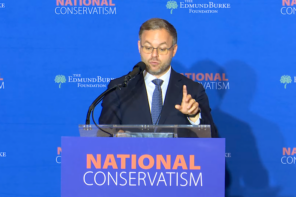During last week’s Friday Sermon, Grand Ayatollah Khamenei sought to connect the events in Egypt to the Iranian Revolution of 1979:
The events of North Africa have a special meaning for the Iranian nation. This is what has always been known as the occurrence of Islamic awakening as a result of the victory of the Islamic Revolution.
In a swift response, the Muslim Brotherhood rejected the comparison:
The MB regards the revolution as the Egyptian People’s Revolution not an Islamic Revolution… asserting that the Egyptian People’s Revolution includes Muslims, Christians, from all sects and political groups.
The Brotherhood’s eagerness to distinguish Egypt from Iran comes as no surprise given the recent flurry of articles speculating on whether or not they will turn Egypt into an Iran-style theocracy. The more conservative press is of course focused fearfully on the core messages of the Brotherhood and how this represents, in the words of Newt Gingrich, a “mortal threat to our civilization.”
In the mainstream press, however, are references to why the Brotherhood is irrelevant despite being the main opposition party. This has primarily stemmed from the fact that the Ikhwan have not played much of a leadership role in organizing the protests, though it’s also based on readings of the group’s history.
“Egypt’s Bumbling Brotherhood,” proclaims an Op-Ed from the New York Times, which gives you a taste. A Guardian editorial tells us “It is right to be anxious about Egypt but not the weary, confused organization that represents political Islam there.” The New Statesman, in an article that draws heavily on Alison Pargeter’s recent book The Muslim Brotherhood: the Burden of Tradition, writes that:
In fact, the Ikhwan [Muslim Brotherhood], as presented in Pargeter’s book, come across much of the time as divided, uncoordinated, ineffective ditherers, and certainly not sufficiently dangerous to warrant being designated an international terrorist organisation, as was feared in the aftermath of the 9/11 attacks.
Two things are worth bearing in mind in reading about the group’s role in the coming weeks and months.
First, the Brotherhood is well aware of the potential backlash, both locally and internationally, if it is seen to have captured the state, which is certainly a factor in how it approaches the coming transition. In the introduction to the 2008 edition of his book, Who Needs An Islamic State?, Dr. Abdelwahab El-Affendi writes:
[T]he Muslim Brotherhood’s electoral success ha[s] made it more vulnerable as a target of the ruling regime. It has also become an obstacle to democracy, as it has been unwilling and unable to bid for power (fearing a local and an international backlash against it if it succeeded); and at the same time unable to build an effective opposition coalition since most opposition groups remain suspicious of its ultimate intentions. In the process, the Brotherhood’s limited success has provided the ruling regime with a pretext for its tenacious resistance to democratization, arguing as it does that democracy will bring to power the “anti-democratic” Islamists.
Dr. El-Affendi’s point about the Brotherhood’s lack of what could be thought of as “revolutionary leadership” brings us to the second point. The Brotherhood, particularly in Egypt, has been characterized by its “tactical carefulness and strategic modesty,” which is evident both in their low-key role in the protests and in their swift response to the Grand Ayatollah’s attempt to paint the Egyptian Revolution a shade of 1979. Their support for ElBaradei can then be read as yet more tactical caution, this time seizing the moment to create a more effective opposition coalition, once again consolidating their role in a new Egypt.
In a recent anthology of essays, The Muslim Brotherhood: The Organization and Policies of a Global Islamist Movement (Palgrave Macmillan, 2010), Barry Rubin asks whether, “its tactical carefulness and strategic modesty [are] a sign of moderation or self-preservation?” Answering his own question, he writes that “The indication is that the truth lies in the latter. If the Brotherhood was seemingly approaching the possibility of power—through election or insurrection—its tone could be expected to change sharply.”
And in fact, over the last few weeks the Brotherhood has not abandoned its cautious approach in the face of potentially rapid regime change. Readings of the Muslim Brotherhood as being ineffective, bumbling, out of touch, and lacking a political base may well be confused by their tactical caution and patience; characteristics perhaps rare in political parties contesting power in more open democratic systems.
The Brotherhood has tremendous experience with being persecuted thus, as one observer put it, “[its] ability to maneuver, build bases of support with patience, pose as moderate, and employ both violent and electoral tactics, make them far more impressive political actors.” Attempts, therefore, to dismiss the Brotherhood as incompetent or irrelevant ignore both the historical and current reality of the Brotherhood as virtuoso political actors and survivors.
Yet being a virtuoso political actor is very different from being a revolutionary. The majority of the crowds of protestors in Tahrir Square are possessed of a revolutionary fire and recklessness that is largely absent from the Brotherhood which appears, by all indications, to be playing the long game.




